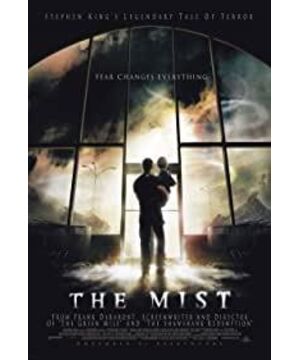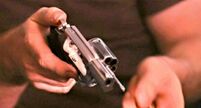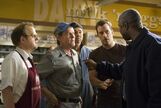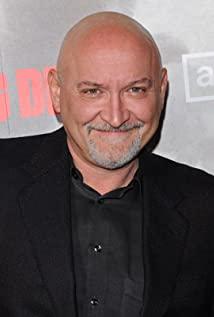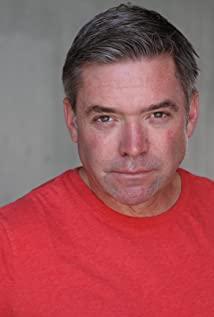Since the beginning of people trapped in the supermarket, three sets of plans for where to go in the future have been gradually brewing: or follow the barrister who treats all this as a farce and go straight out of the supermarket and let the fog go like a joke Just disappear, or follow the woman who believes in Judaism to see all this as God's wrath and punishment and pray for redemption through constant repentance, or follow our hero with calmness and adaptability. If this deadly fog is seen as the vengeance of mankind from the Autre due to its narcissistic hyperinflation (according to the young soldier who was ultimately "martyred" by the believers, this catastrophe is the unintended consequence of scientists trying to open up what they call a "parallel world"), then these three sets of programs actually reflect three attitudes of man towards the other "from hell" provoked by his narcissism: or Either continue to be arrogant and dismissive, or begin to act extremely humble and guilt in the hope of forgiveness, or try to find a way out for yourself between caution and risk.
Of these three, the first to be rejected is the first. Those who follow the barrister's rash move end up falling prey to the narcissistic nature of human beings. The late repentant barrister waited not for any help, but for the strange spider cubs who were full of food and drink, pouring out of their nests. If the barrister who was coherent and articulate in court and who carried the "rational spirit" of the death certificate to this point taught us a lesson, it was the one he left to David when he was gone. That sentence: "The joke is on your own head". Dead instrumental rationality is actually the soil that breeds the irrational things like "joke" - is this the metaphor of the strange spider in the body of the barrister? ——, especially for those who have always been reluctant to give "jokes" a legitimacy, this paranoia about reason, evidence, and logic will one day prove itself to be just one of many "jokes" , and its consequences can even be fatal. So we should imitate Kierkegaard by not only acknowledging that there is a "deadly disease" but also knowing that there is some kind of "deadly joke".
Due to the film's really unpredictable ending, the remaining two paths are not actually as easy to choose as one might initially think. With the development of the plot, people who pay attention seem to see a condensed version of the "history of the origin of the cult" in the Jewish woman: we still remember how lonely and helpless she was at the beginning of the trap, when she repented and prayed to God She is full of compassion and warmth; however, as the situation becomes more and more severe, her "prophecy" becomes more accurate, more and more disciples "convert", and she also begins to behave more and more domineering and cruel, Until the end, he began to incite people to sacrifice living people. At this juncture, it was reluctance for Ollie to shoot her dead—here we not only see the apparent external tension between the human subject and the other, but also clearly feel the often hidden but ever-present tension the tension within the subject itself; in other words, the other is not all as recognizable as the monsters outside the supermarket, the demons from hell are actually not outside the crowd but in the crowd (not only the various monsters are "released" by scientists ', one sees more clearly how the initially terrified populace has unknowingly turned into a murderer of their neighbors) - although he himself failed to achieve the "Victory Escape" in the end.
Just as David drove his car with the other four survivors slowly through one post-disaster ruin, the impatient audience probably got up early, because they expected that the good people below would eventually escape. The old-fashioned ending. However, when David fired four shots in a car that ran out of fuel, everyone must have been stunned, but what was even more stunned was the appearance of military and police tanks after the fog cleared, especially when the military vehicles were loaded with victims from supermarkets. Those "cowards" who were rescued, and when David started driving past the supermarket door, the director had made everyone including the audience believe that he was God and the Savior, but why did he finally become "No Reason" "The devil who took four lives, including his beloved son?
Why is this so? !
It can be seen that what the director and screenwriter want to express is not a fashionable theme such as the simple victory of Sartre-style atheist existentialism over ancient and backward feudal religions, but to explore people's beliefs, religions and ethics, and morals at a more fundamental level. problem. Why wasn't David able to hold on until the troops came to the rescue? Because in the eyes of him and the few "existentialists" in the car who freely chose to control their own destiny, they feel that they have done everything they can, as Wang Anshi said, "Those who do their best but can't make it, can No regrets, who can laugh at it?" In the case that people and themselves have already explained, they finally chose to give up and fight against fate, just like the martyrs who died heroically before the enemy attacked. ——So they finally became Sisyphus who was crushed to death by the boulder, and failed to become the "existential warriors" who really persisted to the end. But perhaps the most important question here is why they didn't choose to keep going. Even if the car stopped, they could still move on with their feet, but why did they choose to give up? Because there is not enough faith to support them to go further. David's beloved wife is dead, and the only pillar of life for him and his son has collapsed, so even if his legs have the strength to get out of the fog, his soul is trapped in it. This may be an opportunity for those fanatical existentialists to calm down and reflect: just relying on "freedom", which sometimes seems to be nowhere and unusually empty, how far can people go? Have those admirers of Sisyphus overestimated the courage and perseverance that human beings can show in the face of adversity?
In this age of escaping gods and growing atheism, it is indeed necessary to rethink the question of religion. Compared with films like "2012" that also involve "God's Punishment", the special feature of "The Mist" is that it does not fall into any kind of optimism trap. Contrary to the end of "2012", which is full of hope, the end of "The Mist" is shrouded in various dark emotions such as regret, frenzy, despair, and confusion. From one point of view, the film is ultimately, as the Jewish woman foretold, after the blood sacrifice (and she played the most crucial role of the martyrdom of Jesus Christ), and ultimately "remains"—that is, to stay "The Lord" left and right—people were redeemed, and all self-righteous ones were punished, and all attempts at self-redemption ended in failure. Therefore, the main theme of the film can be summarized as a call for the return of this era and society to the humility of Judeo-Christianity in this era and society of excessive human narcissism. However, even so, people still have reason to believe that the film finally leaves a way out for another interpretation, and this possibility can be opened up with the following seemingly casual question: "Why is there only one left in the revolver? Four instead of five or more bullets?"
Religious people can certainly use David, who is almost mad at the end of the film, surrounded by all kinds of extreme emotions, to show that his "life is better than death" is not accidental, but because of his The sin was so great (not only repeatedly blasphemous but ultimately killing "without cause") that God intended to torture him in this way. Similarly, from another perspective, he inadvertently can be said to have become a tragic hero, even occupying a more tragic position than Antigone, because he is hands-and Antigone There is at least Creon, the executioner, who has destroyed everything and chose to take all the blame, so whether the end result is madness, suicide, or starting a new life is not the most important thing, because the most important thing is The key is that he has persevered to the end point in his mind, although this end point "could" have been left farther...
View more about The Mist reviews


